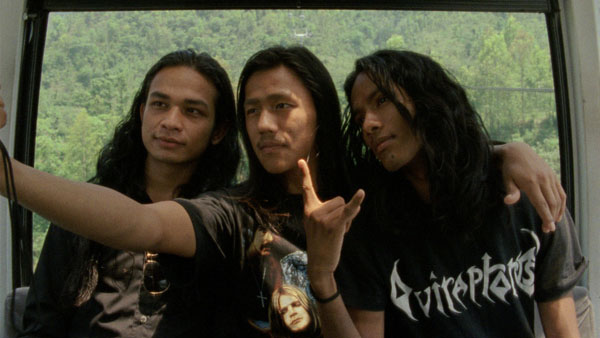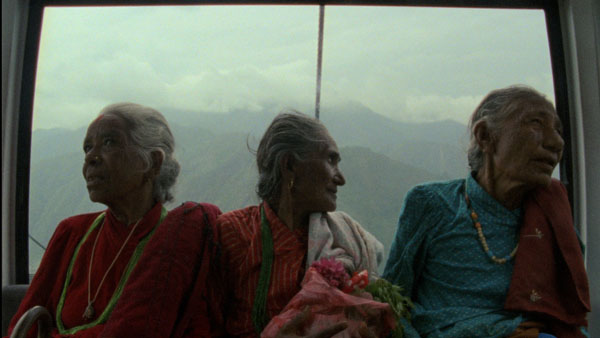“Produced under the aegis of Harvard University’s Sensory Ethnography Lab, Stephanie Spray and Pacho Velez‘s film Manakamana seems to engage with something like a phenomenology of attention,” writes Leo Goldsmith at Reverse Shot. “Like so many of SEL’s projects, this film is a kind of neostructuralist endeavor: eleven eleven-minute shots—roughly the length of a reel of film—taken from a fixed position inside of a cable car ascending (six times) and then descending (five times) a mountain in the Trisuli valleys of Nepal. The cable conveys passengers to Manakamana Temple, the sacred home of the Hindu Goddess Bhagwati, believed to grant wishes to pilgrims, usually in exchange for some kind of sacrifice—a chicken, a goat. The film follows many such pilgrims up the mountain, alone or in small groups: a solitary lady; an elderly trio; three young heavy-metal dudes (and their recalcitrant kitten); a pair of sarangi players; two ladies eating some precipitously melting ice cream…. Manakamana very subtly asserts itself as a film about time, and if not exactly its resistance to being captured, at least our complex relationship with how we experience it.”
“It’s an alternately sad, funny and calming experience, where the relationship between person and camera becomes subject and narrative,” writes Robert Greene at Hammer to Nail. “Hidden stories build with each new passenger. Goats get scared, snacks cause messes, people think, viewers think, transcendence is glimpsed.”
“Digital surely would have been easier,” writes Scott Foundas in Variety, noting that the directors have shot on 16mm film in 400-foot magazines, “but given that one of Manakamana’s running themes is the tension between the ancient and the modern, it’s fitting that Spray and Velez chose to make the film in an almost obsolete format… From a distance, the movie seems effortless, as if Spray and Velez had simply gone out for the day, hitched a ride on the Manakamana express and reported back with their results. Up close, it reveals a more intricate undercarriage than many a scripted feature. A trained ethnographer, the American-born Spray has lived and worked in Nepal since the late ’90s, and together with Velez spent a long pre-production period getting to know the village locals and ‘casting’ the film with subjects who, by virtue of their comfort with the filmmakers, could effectively ‘play’ themselves without being distracted by the presence of the camera and crew (leading some viewers to mistakenly believe that Spray and Velez were not even present in the cable car during the shooting). Yet for all its manipulations and self-imposed restrictions, Manakamana is expansive, intricate and surprisingly playful.”
“The DCP doesn’t capture grain or other obviously celluloid properties very well,” writes Vadim Rizov at Filmmaker, “but note the prominent sound early on of what sounds suspiciously like a film projector; like admitted dual inspiration James Benning, co-directors Stephanie Spray and Pacho Velez probably have zero qualms about soundtrack sweetening for greater subtext and more power to them for that. Expectations of reliable recurring patterns are set up and knocked down throughout, which is intellectually scintillating if sometimes tough going viscerally. It took me nearly two-thirds of the running time to finally enter the rhythm; results will obviously vary.”
“Like Leviathan, Manakamana is far from overt politics, but it can’t help functioning as a snapshot of a changing society, where young heavy metal musicians share space with elderly pilgrims,” writes Steve Erickson at Gay City News.
Peter Labuza and Carson Lund discuss Manakamana in the latest Cinephiliacs podcast. Earlier: Reviews from Locarno, where the film won the Golden Leopard for Special Jury Prize in Filmmakers of the Present and a Special Mention for Best First Feature Film, and Toronto. Manakamana screens today in New York at 3:30 pm.
NYFF 2013 Index. For news and tips throughout the day every day, follow @KeyframeDaily on Twitter and/or the RSS feed. Get Keyframe Daily in your inbox by signing in at fandor.com/daily.





